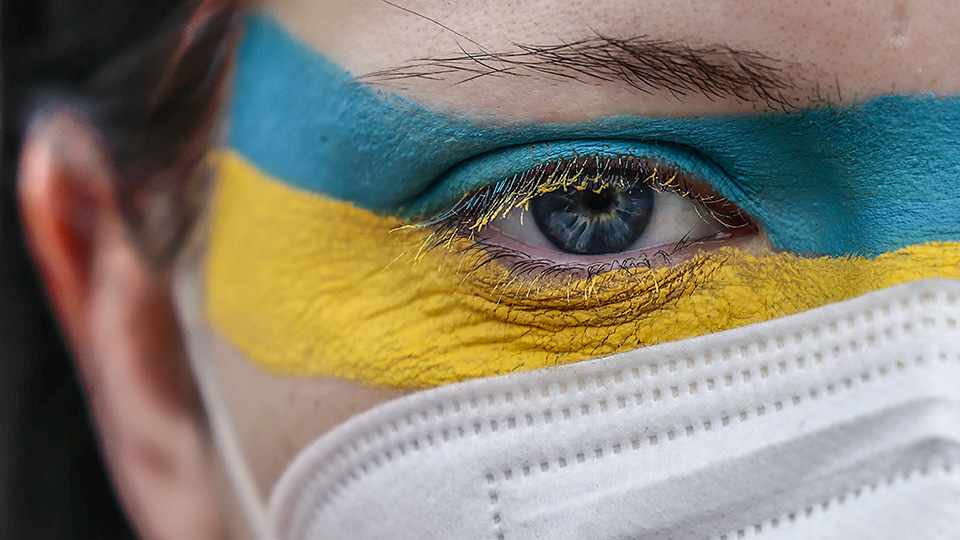Ukraine’s former minister of economic development Tymofiy Mylovanov yesterday addressed more than 1,000 members of the Northwestern University community and the public from the suburbs of Kyiv and warned that Putin won’t stop at Ukraine.
“It’s not going to end with Ukraine if Ukraine falls,” he said.
Mylovanov said U.S. attempts to understand Putin using rational means have failed. “Every time we thought he wouldn’t do that, then he would. And it’s a pattern. It’s a bigger picture than Kyiv,” he said.
The webinar, organized by the Northwestern Roberta Buffett Institute of Global affairs, brought together University experts and former officials to dissect the current war in Ukraine.
Olga Kamenchuk, a professor in the School of Communication and an expert on Russian public opinion, shared the view from Moscow, where she was during the webinar.
She said that fewer Russians are standing behind this war than those who supported the annexation of Crimea in 2014.
“Eight years ago, 95% of Russians were in favor of Crimean annexation. Right now, we see 57% to 65% depending on the pollster,” she said.
Annelise Riles, executive director of Northwestern Buffett, opened the discussion.
“The invasion of Ukraine we have witnessed in recent days is a brazen violation of fundamental tenets of international law and international humanitarian law,” Riles said.
Standing strong and united
Tymofii Brik, a researcher with the Kyiv School of Economics, also joined from a location in the Ukrainian capital.
He said he stood in line to volunteer for the local territorial defense units. “I didn’t get inside because the line was so huge and some men told me they were waiting from the day before,” he said. “Kyiv, like many other places in Ukraine, stands quite strong and united.”
Democracy on the border
Answering a question about what motivates Vladimir Putin, Jordan Gans-Morse, professor of political science at Northwestern and an expert on the former Soviet Union, said that many factors are at play including the fact that “It’s intolerable to [Putin] to have a democratic nation … right on his border, creating some sort of model that his own people might want to follow.”
Operational pivot
Michael Rogers, former director of the National Security Agency, now adjunct professor at Northwestern’s Kellogg School of Management, discussed the military picture in light of Russia’s current behavior in the battlefield.
“So, as I look at the Russian military, I see a series of military activities that have failed to achieve their objective that are behind schedule … so you're [now] seeing a bit of an operational pivot,” Rogers said.
He said the Russians are committing additional heavy forces and are going after key infrastructure. “The Russians are really doubling down on this,” Rogers warned. He expects the level of violence and the application of force to increase significantly.
Cyber warfare
V.S. Subrahmanian, a Buffett Faculty Fellow and a global authority on cybersecurity, said the Russians have so far shown incompetence in the cyber space.
“I'm surprised that the Russian cyber warfare component has not been as severe as I expected,” Subrahmanian said. “That said, we do not and cannot rule out the fact that they have a lot more, you know, heavy hitting to bring to the table down the road.”
Rogers, who also previously spent four years as head of the U.S. Cyber Command, said that while the cyber element has not been as aggressive as we had expected, he thinks it may change very quickly. “[Putin] is looking for tools right now that he can use to increase the pressure on the West,” Rogers said.
Diplomatic off-ramp
On the diplomatic front, Ian Kelly, ambassador-in-residence at Northwestern and former U.S. Ambassador to Georgia and to the OSCE, doesn’t see a fruitful path.
“I think it's very difficult, unfortunately, to see a diplomatic off-ramp for this crisis. I think the main reason for that is that Putin has given some very maximalist demands to the U.S. to NATO, and of course to Ukraine itself,” Kelly said.
Earlier in the day, approximately 150 people gathered at Harris Hall on the Evanston campus for an in-person teach-in hosted by the history department and led by Weinberg Professor Yohanan Petrovsky-Shtern, an expert on Ukrainian and Jewish history.
"Russia is coming with enormous military might into Ukraine... but it is already the fifth day, and most major cities they wanted control of are still under Ukrainian control," Petrovsky-Shtern said. "What is important is not what Putin says, but what he does."
Students also asked about the nuclear threat.
"Nuclear weapons are the last 'Trump' card, pun intended," Petrovsky-Shtern said.
"Putin is helping to bring different parts of Ukraine together, to create national unity and a new political nation."


